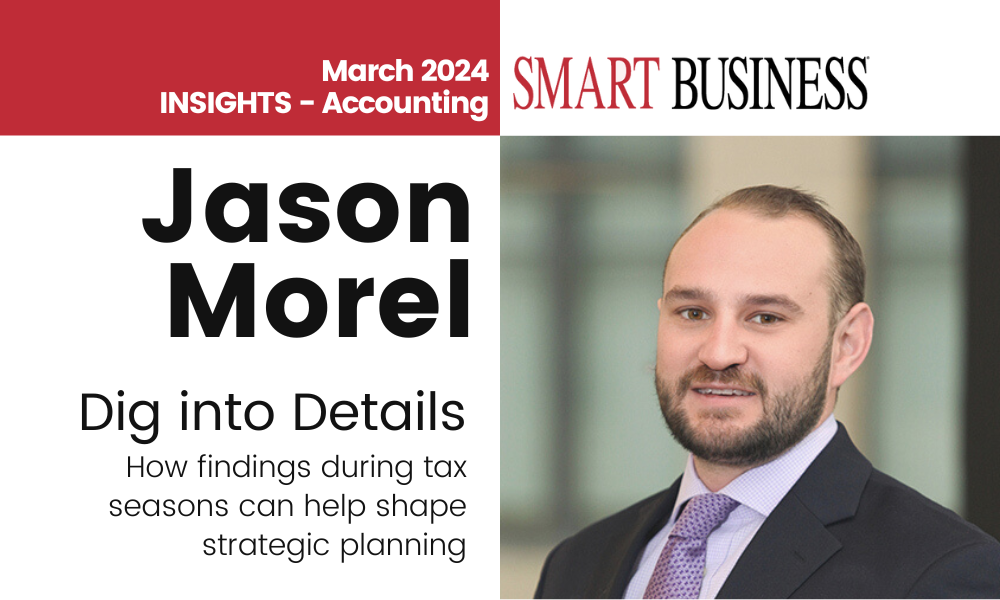
Corrigan Krause Senior Valuation Analyst Jason Morel recently talked with Smart Business. Below is the full interview, which appeared in the March 2024 issue of Smart Business.
When it comes to taxes, the prevalent feeling among business leaders is that they just want to get through it. However, while taxes may seem as if they’re just numbers, according to Jason Morel, Senior Valuation Analyst at Corrigan Krause, a company’s taxes can tell an important story about the state of the business and where it’s headed.
“Taxes tell the story of a company’s performance,” Morel says. “The numbers show business leaders which areas the performance of their company has been healthy and where it has been unhealthy. The numbers can tell them where to make adjustments to improve and how to carry those lessons over into other aspects of the business. It’s an opportunity that’s too often overlooked.”
Smart Business spoke with Morel about the story that taxes can tell a business and how to translate that story into better strategic planning.
Why do tax time and year-end financials deserve closer attention from business leaders?
Maintenance and attention are imperative for any business. Tax time and the related year-end results is an opportunity to ask questions to learn why the numbers are the way they are — what are the factors that produced these annual numbers?
These inquiries can lead to answers as to how to address problems that are uncovered. It’s a chance to break the business out of stagnation by identifying trends and changing tactics, instead of doing the same thing over and over. Business owners can easily get caught up in putting out ‘fires’ day-to-day, and might not focus on reviewing and learning from their annual results and comparisons over the historical past.
Business leaders can identify trends within their business by comparing the company’s financial performance results on a year-over-year basis. That can help them bring into focus how a broader picture of how the company has done over the past few years. With that data in hand, the most important question to ask is why? For example, if sales are trending up, explore the reasons that could have led to the change. It’s also an opportunity to see if what was done to get a boost in the sales department can be applied to other aspects of the business that aren’t doing as well.
What challenges might the pandemic present in tracking trends over the years?
Identifying trends within a company over the past few years has become complicated because of the pandemic. Since company performances during those years were often anomalous, they tend not to be as heavily weighted by companies and their advisers because there were unique and nonrepeatable outside factors. Still, those sets of numbers tell a story and lessons from that time should be extracted to inform how the business moves forward. For example, it’s opened the eyes of many business leaders regarding the importance of operating agreements, a range of insurance coverages, disaster management, and good communications and relationships with key advisers.
How can business leaders translate tax findings into their strategic planning?
The best plan is to have a plan. That can start with discussions with key advisers. But to keep the momentum going and ensure changes are enacted and are moving the needle, those conversations need to be kept up with throughout the year. That could mean a monthly or quarterly call with advisers to discuss progress and barriers to improvement. If those discussions continue to happen on a regular basis, when tax time comes around it’s less likely there will be surprises, which makes everybody’s jobs a lot easier and far more efficient.
Key advisers to connect with during this process should include consultants, tax advisers and accountants. They can help business leaders better understand the tax numbers as well as their financial trends over recent years.
Business leaders should explore all areas of the business and be extremely detail oriented. Successful business leaders don’t let aspects of their business go to the wayside or be ignored. By binging advisers in on the ground floor, they’re able to get into the nitty gritty of the details to find solutions and help put a plan together that can carry the business into the next year and beyond.






